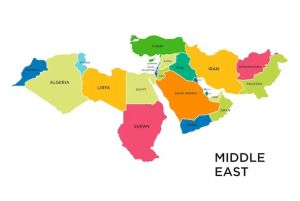Middle East

Middle East is a region of immense historical, cultural, and geopolitical significance. Stretching from the eastern Mediterranean to the Persian Gulf, this region encompasses a diverse array of cultures, languages, and religions. Throughout history, the Middle East has been a cradle of civilization, a center of trade and commerce, and a focal point of political power struggles. This article explores the rich history, cultural heritage, and modern dynamics of the Middle East.
Historical Overview[edit | edit source]
Ancient Civilizations[edit | edit source]
- Mesopotamia: Often referred to as the "Cradle of Civilization," Mesopotamia (modern-day Iraq) was home to the Sumerians, Akkadians, Babylonians, and Assyrians. These ancient civilizations made significant contributions to writing, law, and urban development.
- Ancient Egypt: Located along the Nile River, ancient Egypt is renowned for its pyramids, pharaohs, and monumental architecture. The Egyptians made lasting contributions to mathematics, medicine, and astronomy.
- Persian Empire: The Achaemenid Empire, founded by Cyrus the Great, was one of the largest empires in ancient history, stretching from the Balkans to the Indus Valley. The Persians are noted for their advancements in governance, architecture, and cultural exchanges.
The Rise of Islam[edit | edit source]
The 7th century saw the rise of Islam, founded by the Prophet Muhammad in Mecca (modern-day Saudi Arabia). Following Muhammad's death, the Rashidun and Umayyad caliphates expanded Islamic rule across the Middle East, North Africa, and parts of Europe and Asia.
Golden Age of Islam[edit | edit source]
The Abbasid Caliphate (750-1258 AD) marked a period of intellectual and cultural flourishing, known as the Islamic Golden Age. Cities like Baghdad, Cairo, and Cordoba became centers of learning and innovation, with significant advancements in science, medicine, philosophy, and the arts.
Ottoman Empire[edit | edit source]
The Ottoman Empire (1299-1922 AD) emerged as a major political and cultural force in the Middle East and beyond. At its height, the empire controlled vast territories in Europe, Asia, and Africa. The Ottomans made notable contributions to architecture, art, and administration.
Cultural Heritage[edit | edit source]
The Middle East is characterized by its rich and diverse cultural heritage, influenced by a myriad of civilizations and religions.
- Languages: Arabic, Persian, Turkish, Hebrew, and Kurdish are among the major languages spoken in the region. Each language carries its own literary and cultural traditions.
- Religions: The Middle East is the birthplace of three major world religions: Judaism, Christianity, and Islam. Additionally, it is home to diverse religious communities, including Zoroastrians, Druze, and Bahá'ís.
- Art and Architecture: The region is known for its intricate calligraphy, stunning architecture (such as the Alhambra, Dome of the Rock, and Persepolis), and vibrant arts and crafts.
- Cuisine: Middle Eastern cuisine is celebrated for its flavorful dishes, including kebabs, hummus, falafel, and baklava. The use of spices, herbs, and fresh ingredients is a hallmark of the region's culinary traditions.
Modern Dynamics[edit | edit source]
Political Landscape[edit | edit source]
The Middle East is a region marked by complex political dynamics and ongoing conflicts. Key issues include territorial disputes, sectarian tensions, and geopolitical rivalries. The Israeli-Palestinian conflict, the Syrian civil war, and tensions between Iran and Saudi Arabia are among the significant challenges facing the region.
Economic Development[edit | edit source]
The Middle East is rich in natural resources, particularly oil and gas. Countries like Saudi Arabia, UAE, and Qatar have leveraged their energy wealth to drive economic development and modernization. However, the region also faces economic disparities and challenges related to diversification and sustainability.
Social and Cultural Changes[edit | edit source]
The Middle East is undergoing significant social and cultural transformations. Youth movements, advancements in education and technology, and increasing demand for political and economic reforms are reshaping the region. Women's rights and gender equality are also gaining greater attention, with gradual progress being made in some countries.
Conclusion[edit | edit source]
The Middle East is a region of profound historical significance, rich cultural heritage, and dynamic modern realities. Its contributions to human civilization are immense, spanning from ancient innovations to contemporary cultural expressions. Understanding the complexities of the Middle East requires a nuanced appreciation of its history, culture, and ongoing developments. As the region continues to evolve, its influence on global affairs remains substantial and far-reaching.